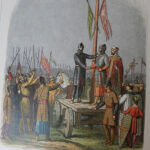16 July 1858: Walter White meets two Middlesbrough families on Roseberry Topping
Walter White. 1861. A Month in Yorkshire, 4th Ed. London: Chapman and Hall. The best of White’s travel writing, in which, as usual, he encounters and investigates the Plain People. This is the golden age of walking, when there were good roads pretty much everywhere, and they hadn’t yet been made inaccessible to pedestrians by cars. His July is told in 31 chapters, which seem to refer to the days of the month. Get it:
.Unedited excerpt
If an excerpt is used in the book, it will be shorter, edited and, where applicable, translated.
More than an hour slipped away while I lounged and loitered, making the round of the summit again and again, till it seemed that the landscape had become familiar to me. Then the solitude was broken by the arrival of strangers, who came scrambling up the hill, encouraging one another, with cheerful voices. They gained the rocks at last, panting; two families from Middlesborough, husbands, wives, boys and girls, and a baby, with plenty to eat and drink in their baskets, come from the murky town to pass the Sunday on the breezy hill-top. How they enjoyed the pure air and the wide prospect; and how they wondered to find room for a camp-meeting on a summit which, from their homes, looked as if it were only a blunt point! They told me that a trip to Rosebury Topping was an especial recreation for the people of Middlesborough – a town which, by the way, is built on a swampy site, where the only redeeming feature is ready access to a navigable river. I remember what it was before the houses were built. A drearier spot could not be imagined: one of those places which, as Punch says, “you want never to hear of, and hope never to see.”
“’Tis frightful to see how fast the graves do grow up in the new cemetery,” said one of the women, whose glad surprise at the contrast between her home and her holiday could hardly express itself in words. “It can’t be a healthy place to bring up a family in. That’s where we live, is it—down there, under all that smoke? Ah! if we could only come up here every day!”
Middlesborough, as we can see from far off, is now a large town, numbering nearly 8000 inhabitants in 1851, and owes its sudden growth to coal and iron. There the smelting furnaces, roaring night and day, convert hundreds of tons of the Cleveland hills every week into tons of marketable iron. The quantity produced in 1856 in the Cleveland district was 180,000 tons. And there is the terminus of the “Quakers’ Railway;” a dock, of nine acres, where vessels can load at all times of the tide; an ingenious system of drops for the coal; branch railways running in all directions; and a great level of fifteen acres, on which three thousand wagons can stand at once.
Comment
Comment
I guess the families had alighted at Pinchinthorpe station on the Middlesbrough and Guisborough Railway and walked the last couple of miles.
Something to say? Get in touch
Similar
 22 August 1138: King David of Scotland is overtaken near Northallerton by a furious local army in possession of a great standard – a Victorian view
22 August 1138: King David of Scotland is overtaken near Northallerton by a furious local army in possession of a great standard – a Victorian view 19 October 1816: Serenaded by the military, decorated barges leave Leeds for Liverpool to celebrate the completion, after almost 50 years, of the canal uniting east and west
19 October 1816: Serenaded by the military, decorated barges leave Leeds for Liverpool to celebrate the completion, after almost 50 years, of the canal uniting east and west
Comment
Comment
Chapter 5 of the 31 of White’s month of July, so perhaps the 5th.
In many words we change ol and owl into au; as for cold they say caud; for old, aud; thence Audley, as much as to say Old Town; for Elder, Auder; or as we write Alder; thence Alderman, a Senator; for Wolds or Woulds, Wauds; thus the ridge of hills in the east, and part of the North Riding of Yorkshire (our Apennine), is called: and sometimes the country adjoining is called the Wauds. But that which lies under the hills, especially down by Humber and Ouse side, towards Howden, is called by the country people the Lowths, i.e. the low country, in contradistinction to the Wauds. Though some call all the East Riding besides Holderness, and in distinction from it, the Woulds (Ray 1691).
The James Gilchrist quote is from his Intellectual patrimony (Gilchrist 1817).
Something to say? Get in touch
Search
Donate
Music & books
Place-People-Play: Childcare (and the Kazookestra) on the Headingley/Weetwood borders next to Meanwood Park.
Music from and about Yorkshire by Leeds's Singing Organ-Grinder.


 Bluesky
Bluesky Extwitter
Extwitter